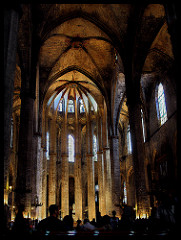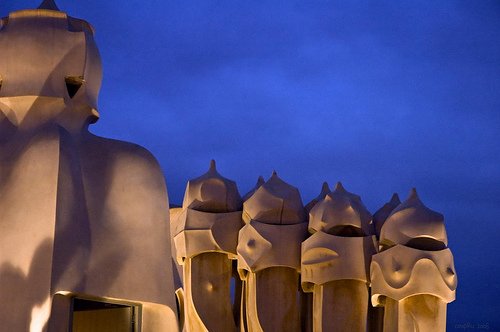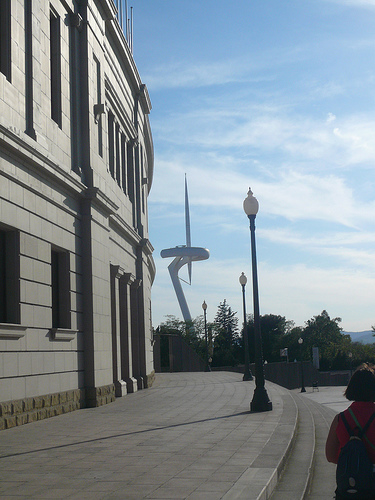BCN's History and Culture

I would like to start this blog by introducing the city of Barcelona, touching mostly on its history and culture. First of all, it is very important to understand that Barcelona is the capital of Cataluña, a region of Spain that is considered an Autonomous Community, but most importantly the locals refer to themselves as Catalans and not necessarily Spanish, and their first Language is not Castellano (Spanish) but Catalan. Obviously the population reflects a wide spectrum of thoughts and ideas about the matter. You'll find both extremists, that want to claim independence from Spain, and moderates. After living here in BCN for almost 3 years, I can say most Catalans are proud of their heritage, as they should be, but also happy to be part of Spain. As I said, the language of Catalans is Catalan, but of course everyone speaks Spanish too. Barcelona has a great amount of foreign immigrants from Latin America, Europe and Asia, and the great majority of them immigrants don’t end up learning Catala, because everyone speaks Castellano (Spanish). The History of Barcelona is very interesting and very long, if anyone is interested in learning more about it, I would recommend a book called Historia de Barcelona, by Jaume Sobrequés i Callico. I will make a very short summary, though. The name Barcelona comes from the Latin Barcino. Barcelona was not always the biggest city in Cataluña, Tarragona used to be the biggest one before Romans came and took this area to try and win the control of the Mediterranean against the Carthaginians. Still today we can see many ruins left by the Romans around Cataluña.  Later Barcelona was invaded by Visigoths, followed by Muslims, but then the French pushed the Muslims downwards in the Spanish peninsula. Around the 14th century, thanks to some good diplomatic and military strategies, Barcelona, as the most important city in the Kingdom of Aragon, had control over the now Italian Sicily and Sardinia as well as the Kingdom of Valencia and the Balearic Islands. Trade in the Mediterranean would be a major boost to the enrichment of the region. In the 17th century, the Black Death, a civil war, the War of Segadors and the War of Succession would erode Barcelona’s economic and political power as well as its independence. There was a general repression from Castile towards the Catalan Culture.
Later Barcelona was invaded by Visigoths, followed by Muslims, but then the French pushed the Muslims downwards in the Spanish peninsula. Around the 14th century, thanks to some good diplomatic and military strategies, Barcelona, as the most important city in the Kingdom of Aragon, had control over the now Italian Sicily and Sardinia as well as the Kingdom of Valencia and the Balearic Islands. Trade in the Mediterranean would be a major boost to the enrichment of the region. In the 17th century, the Black Death, a civil war, the War of Segadors and the War of Succession would erode Barcelona’s economic and political power as well as its independence. There was a general repression from Castile towards the Catalan Culture.  During the 19th and 20th century Barcelona began to pick itself up again. There was a great emphasis on the emergence of the sciences, technology, engineering and so on. In fact La Salle Bonanova dates back to 1903 in the specialities of electrical, mechanical and chemical engineering. This would also be a period where Barcelona would become a cultural centre for Europe’s cultural elite. Modernism was one of the main movements to influence Barcelona and of course Gaudi and his works are the main proof of this today. In 1936 the Civil War devastated the city and its people. Later, Franco’s dictatorship would take away all political independence achievements and the freedom to speak Catalan language. Finally, after Franco’s death, Barcelona was able to claim its status as Capital of the Autonomous Region of Cataluña.
During the 19th and 20th century Barcelona began to pick itself up again. There was a great emphasis on the emergence of the sciences, technology, engineering and so on. In fact La Salle Bonanova dates back to 1903 in the specialities of electrical, mechanical and chemical engineering. This would also be a period where Barcelona would become a cultural centre for Europe’s cultural elite. Modernism was one of the main movements to influence Barcelona and of course Gaudi and his works are the main proof of this today. In 1936 the Civil War devastated the city and its people. Later, Franco’s dictatorship would take away all political independence achievements and the freedom to speak Catalan language. Finally, after Franco’s death, Barcelona was able to claim its status as Capital of the Autonomous Region of Cataluña.  As we all know, in 1992 Barcelona would host the Olympic Games and it was thanks to this event that the city took a major step into what it is today. There was a great architectural and urban transformation and the Olympic Games would be a great opportunity to introduce this new Barcelona to the World. Since the Olympics, Barcelona has become one of the main tourist destinations in Europe, and it's host to many international events, such as the Mobile World Congress and the Bread & Butter Fashion Show. It is a melting pot of cultures, an economic hub and an artistic and cultural focus point. Barcelona is a metropolis, but at the same time it’s relatively small (1.6 million people). It has beaches in the city or close by - in Costa Brava, Costa Daurada, etc... - as well as skiing mountains not too far away. On a sunny winter day, you could start off on the slopes and end up having an afternoon on a boat. Some people call it the European California, some call it The City of Counts. For now, I call it Home. What will you call it?
As we all know, in 1992 Barcelona would host the Olympic Games and it was thanks to this event that the city took a major step into what it is today. There was a great architectural and urban transformation and the Olympic Games would be a great opportunity to introduce this new Barcelona to the World. Since the Olympics, Barcelona has become one of the main tourist destinations in Europe, and it's host to many international events, such as the Mobile World Congress and the Bread & Butter Fashion Show. It is a melting pot of cultures, an economic hub and an artistic and cultural focus point. Barcelona is a metropolis, but at the same time it’s relatively small (1.6 million people). It has beaches in the city or close by - in Costa Brava, Costa Daurada, etc... - as well as skiing mountains not too far away. On a sunny winter day, you could start off on the slopes and end up having an afternoon on a boat. Some people call it the European California, some call it The City of Counts. For now, I call it Home. What will you call it?